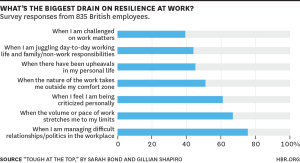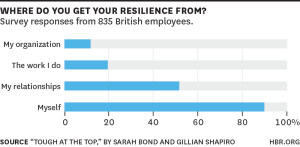
I’ve spent most of my adult life working with start-up companies, some successful and some not so much. Having ridden the roller coaster up and down for so long, I’ve noticed that resilience is a quality shared by many of the people I work with.
They are optimistic. They are able to look at a problem from multiple points of view. They are willing to risk failure in pursuit of building something new and meaningful. I love being with these people, which explains (to me anyway) my own attraction to businesses that are constantly on the edge.
When I came across this article in Harvard Business Review about resilience in the work place it caught my attention.
A small survey of British employees asked “What’s the biggest drain on resilience at work?” and 75% of respondents pointed to office politics and managing difficult relationships with co-workers.

The article goes on to mention several books that look at how to sustain resilience and build it into corporate culture by addressing some of these problems. However, I thought the perspective of the respondents was most interesting.
When asked where they get their own resilience, very few mentioned their organization or their work. Only about half cited their relationships. Instead 90% of the respondents said they find their resilience within themselves.

Happiness research suggests this perception is accurate. Although we may have grown up thinking, if I’m successful then I’ll be happy, it turns out we have it backwards. In business it’s the happy people who tend to be successful.
A few years ago I met Shawn Achor while working on a project for one of my start-ups. I later watched his TEDx talk on happiness and work. The research he describes supports the notion that people whose brains perceive happiness are more likely to see business success. They keep their jobs longer, are more productive, showing more resilience and less burnout. Their businesses have less turnover and an improved ability to create more sales.
I’ve posted the TEDx talk here for you because not only will it make you laugh, it suggests some very simple habits to help us reflect on the positive and recognize our own happiness: gratitude, meditation, journaling, exercise, and random acts of kindness.
Additional reading:
Barry Winbolt blogs on Resilience at Work
Kerry Hannon in Forbes, on Six Key Steps for Career Resilience

